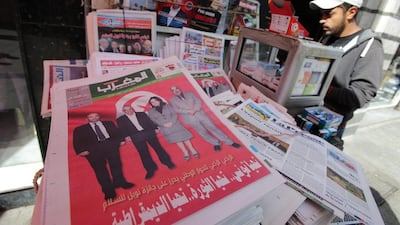TUNIS // When Tunisians harbour doubts about where their country is headed, more than four years on from their revolution, they realise from looking around the region that things could be so much worse.
The idea that Tunisia is, overall, a haven of reasoned problem-solving in a troubled region has now been endorsed and applauded by the Nobel committee in Oslo. It announced on Friday that this year’s Nobel Peace Prize goes to a panel of mediators — the National Dialogue Quartet — which played a crucial role in defusing a stand-off in the summer of 2013. Its four members represented Tunisia’s business community, its trade union movement, its human-rights activists and its lawyers.
The Quartet was created at a time when the ruling Ennahda party had been backed into a corner by opponents who had deep suspicions about what role religion would play in government. Tensions had mounted following the assassination on July 25 of Arab nationalist politician Mohamed Brahmi, following the similar killing of leftist leader Chokri Belaid in February. Leftist and secular politicians accused Ennahda of tolerating violent groups on its fringes.
There were calls for the dissolution of the constituent assembly. Elected in 2011, it was the closest thing the country had to a parliament. Demonstrations and counterdemonstrations gathered momentum as opponents of Ennahda sought to have the party forced out of government and discredited as a political player. Some even looked to the example of Egypt’s president Mohammed Morsi, removed from power by the army earlier in July.
For the Nobel committee, the Quartet was key in setting in motion “an alternative, peaceful political process at a time when the country was on the brink of civil war”.
In late August and September 2013, the UGTT trade union federation and the Tunisian Order of Lawyers put out feelers to political parties to see if they would accept mediation. “Gradually, even parties that had been dubious began to participate” in the dialogue, notes Mounir Soussi, law professor at Tunis University. The fact that wide swathes of society were represented in the Quartet gave the process legitimacy.
The UGTT secretary general, Hocine Al Abassi, who was quietly opposed to having the elected assembly dissolved, would emerge as a key mediator within the Quartet. “The UGTT showed remarkable ability in pivoting from being implacable opponents of the Ennahda-led government to being leaders of the successful dialogue initiative,” says Jonathan Murphy who as head of UN support for the constitutional process followed events closely.
There was an extremely tense atmosphere as direct talks started in October, recalls one participant. “People were meeting each other for the first time since that period of escalation. It was inevitably tense … But we Tunisians like to laugh and tease each other.” Humour played a part in breaking the ice.
Spadework for entente had in fact been carried out by members of the constituent assembly. Through early 2013 they had learnt to make trade-offs to stake out common ground over the wording of the new constitution.
The Quartet was an ad hoc solution that worked, says Jerome Heurtaux, a researcher with of the Institute for Research on the Contemporary Maghreb in Tunis. Some commentators have criticised it as a mechanism that undermined the country’s fledgling democratic institutions, but this argument fails to take into account the particular context that summer, he believes.
“In the end, democracy was the winner,” concurs Aziz Krichen, a former political adviser to president Moncef Marzouki. Perhaps it is an exaggeration to say the country was teetering on the edge of civil war, “but it was going through an acute political crisis that did indeed risk degenerating into violence”. As part of the compromise hammered out in the dialogue, a non-party government was eventually installed to take Tunisians up to another general election, in October 2014.
Ennahda continued as a legitimate political actor, and Tunisian voters had a second opportunity to use their votes wisely.
For Mr Huertaux, the peace prize “can be read as a signal to Tunisian civil society to continue with its work”.
Non-governmental institutions and other “civil society” bodies are continuing to provide independent voices on a range of issues, outside the push and pull of party politics, as Tunisia consolidates democratic institutions. After two attacks by gunmen on foreign tourists inflicted scores of casualties this year, this task has taken on additional urgency.
If the Nobel Prize is a well-timed reminder that compromise and dialogue can offer a way forward, it should not be read as a general endorsement of deal-making by elites behind closed doors, observers argue. Cosy deals in the capital are nothing new to Tunisia, but should nowadays, arguably, be only a last resort.
foreign.desk@thenational.ae

